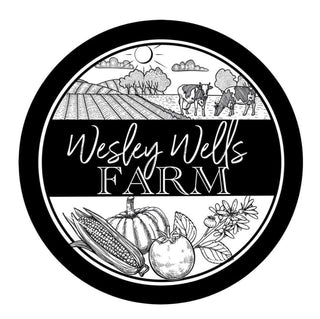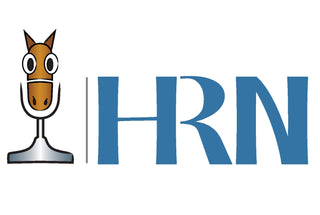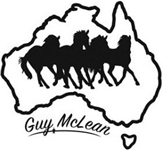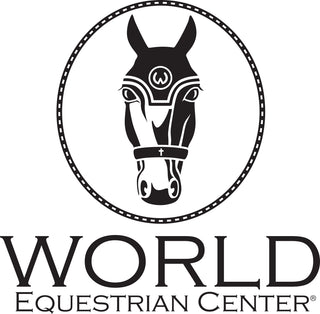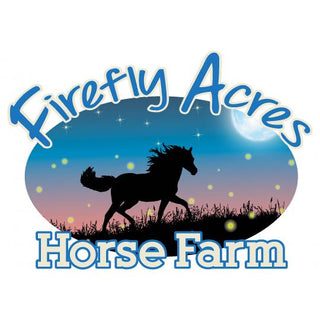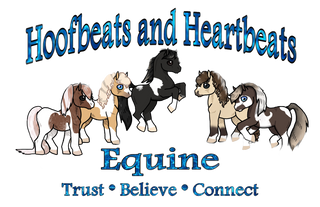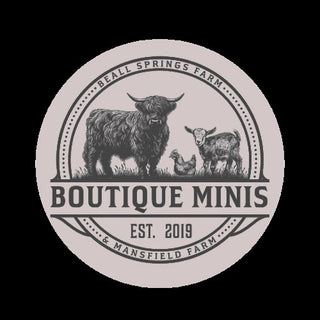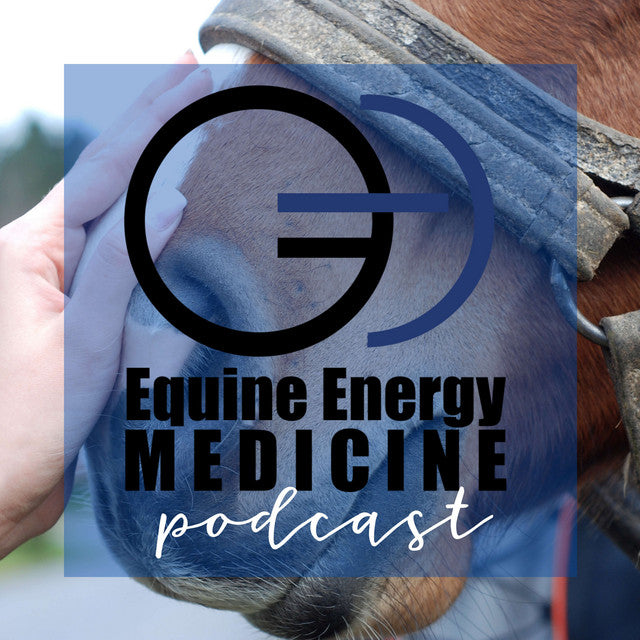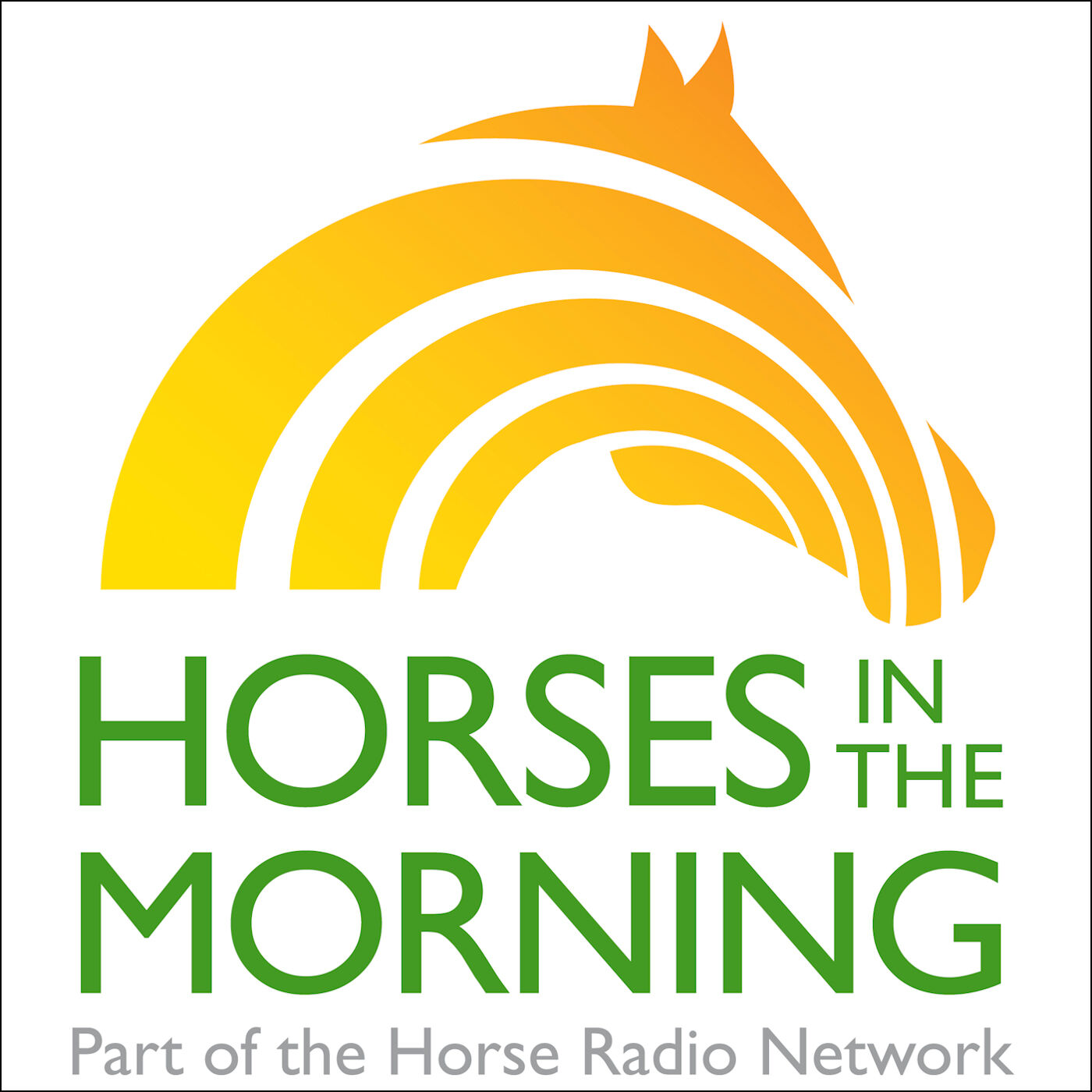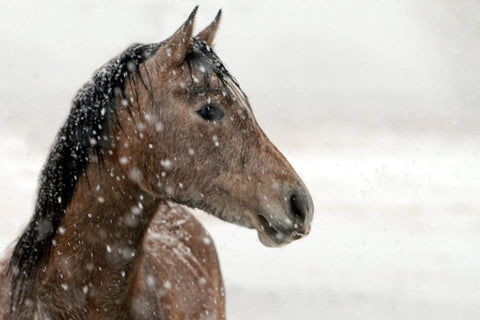
You'll be hard-pressed to find an equestrian who looks forward to winter. Especially one that lives in a state with snow, sleet, ice, and regular temperatures below freezing.
Winter can be a challenging (for lack of a better word) season for horse owners, as the cold weather and reduced pasture turnout can impact, well, everything. However, with proper care and a few tweaks to your schedule, your horses can thrive during the winter months.
In this article, we'll explore the many aspects of winter pasture care. We've got plenty of
valuable, shareable tips to keep your horses healthy and happy when the snow falls and you inevitably begin to question all of your life choices.
How Colder Weather Can Affect Equine Health and Why
All horse owners should have a firm grasp of the weather-related factors that affect equine health. As temperatures drop, it's essential to understand how colder weather presents potential problems, even for healthy horses!
Subpar Forage
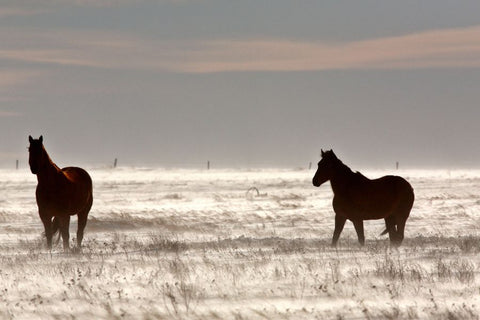
During winter, the availability of fresh, nutritious forage decreases, even in the warmer states. Lack of grass and the ability to forage in a more natural setting, like a paddock or pasture, leads to a decrease in the quality and quantity of food your horses can access.
When the frost is plentiful, and the grass is sparse, equine owners and barn managers turn to hay. It's crucial to have enough hay to supplement natural forage for your horses during the winter.
Planning ahead and accommodating for the additional hay your barn will require is a must. The simple calculation is that the average horse needs 2% of its body weight in hay daily.
Of course, always discuss nutrition changes with your veterinarian, as diet can vary from horse to horse!
Reduced Physical Activity
Cold weather often means reduced turnout time for horses. Not only does it get bone-chilling cold in many parts of the country, but the snow and ice can make for some terrible footing.
Horses are technically livestock (blasphemy, I know), and many of them can tolerate time out in the cold and snow. Some horses even enjoy it!
How much time your horses will spend outside depends on many factors, including age, weight, coat, shelter access, hoof condition, the weather forecast, and more.
Spending extended periods in stalls, standing around because of deep snow and slippery ice, and hanging out in smaller paddocks lead to a lack of exercise. In short, not moving much will eventually negatively impact their health, both physical and mental.
Increased Risk of Colic
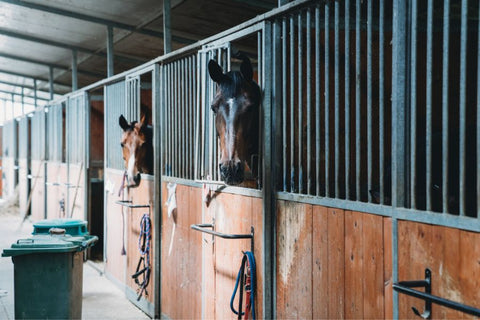
Changes in feed and reduced exercise can increase the risk of colic in horses. It's crucial to monitor their diet and ensure they have access to clean, fresh water.
Which leads us to a whole new beast. Equestrians know the difficulty that comes with getting many horses to drink water when the weather is cold. After all, frozen water buckets and ice-cold water are less than appealing.
Make sure your stall buckets have insulated covers, and your pasture troughs feature electric heaters. Also, it never hurts to add electrolytes to grain buckets when it's chilly out. Your horses will thank you!
Protecting Pastures
Maintaining healthy pastures takes effort year-round. Limiting grazing during the winter, if grazing is possible, will prevent overgrazing and soil compaction. If you live in an area that does have wintertime grass, keep your ponies on a rotational grazing schedule.
If you want a solid pasture with lush growth in the spring and summer, stay on top of winter care. Don't keep your horses away from the grass in an attempt to keep it healthy.
We know it's tempting to stall them to avoid injury, blanketing, and bringing them back and forth out of the weather, but they need that outside time. Read on to learn more!
Why Winter Turnout is Important

Even in the cold season, turnout is crucial for your horse's physical and mental well-being. Let us emphasize: crucial.
Here's why providing opportunities for winter turnout and exercise is a non-negotiable part of horse ownership.
Mental Stimulation and Well-Being
Horses are naturally social and active animals. They, quite literally, need to be together, even if it's not in the same pasture. Regular turnout allows them to interact with their environment and other horses, reducing boredom.
All horses crave mental stimulation. Stalled horses can become stressed rather quickly, primarily when they’re not used to being stalled, leading to undesirable behaviors, such as cribbing or weaving.
Access to the outdoors and the ability to move freely permits engagement in natural behaviors like grazing, socializing, and exploring their surroundings. Horses who get safe winter turnout are generally happier and more content.
If you don't have access to safe pastures or paddocks in the winter, a round pen with solid footing or an indoor arena can work wonders.
Physical Exercise
Regular exercise, even in that smaller paddock or arena I just mentioned, helps maintain muscle tone, joint health, and overall fitness. It also aids in digestion and prevents stiffness.
If you've got an arthritic horse, movement in the winter months will keep them feeling fantastic. Don't let that cold sink too far into their joints!
Hoof Health
Hooves can be a real pill, especially when the weather calls for wetness. From sleet to snow flurries, winter comes with a whole lot of wetness.
Turnout helps prevent hoof problems such as overgrowth. If you don't want to see the farrier every four weeks, winter turnout and exercise are your friends.
Preventing Respiratory Issues
Spending extended periods in a stall can lead to poor air quality and increased dust and allergens. Constant, around-the-clock exposure can have a detrimental impact on your horse's respiratory health.
Allowing your horse turnout time in a paddock or pasture during the winter will enable them to breathe in fresh, clean air, decreasing the risk of respiratory issues like heaves or allergies.
How to Keep Your Winter Pastures Clean
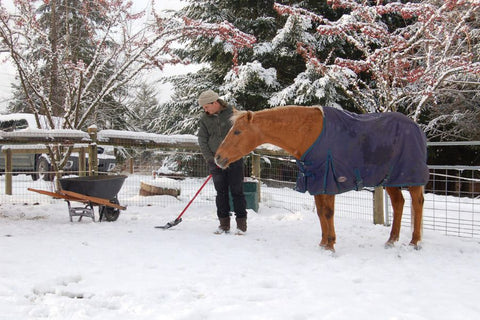
Photo Credit - Colorado Horse Source - Alayne Blickle
Here are some tips to help you with your winter pasture maintenance.
Regular Manure Removal
Frequent manure removal prevents the buildup of waste, which can attract flies and parasites. If you lack bugs in the winter like most of the Northeast, leaving winter paddocks full of poo is still unsanitary and encourages the spread of disease.
Use a Paddock Blade or manure spreader to remove or distribute manure. We recommend removal, especially near hay bags, water troughs, and feed pans, run-in sheds, and popular herd hangout spots.
Adequate Drainage
Proper drainage is crucial to prevent mud and standing water, which is a complete nightmare for hooves and the onset of fungal infections like Scratches. Consider installing gravel or stone dust in high-traffic areas to improve footing. Laying hay or straw over your muddiest areas can help.
How Paddock Blade Makes a Massive Difference
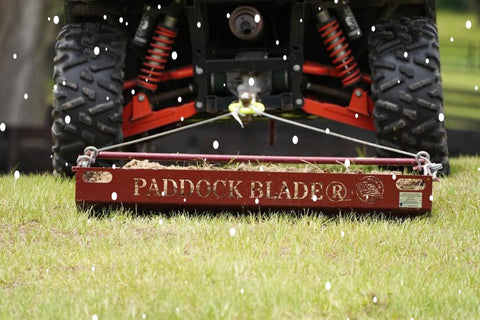
The Paddock Blade is a valuable tool for winter pasture care. It makes clean turnout areas entirely achievable for you by assisting in maintaining a clean and healthy environment for your horses with minimal effort on your end. We're nothing if not quick and efficient and incredibly well-made.
But hear this. By removing manure and debris, Paddock Blade promotes better pasture growth and reduces the risk of mud and ice buildup. Say what?
Yes, indeed, Paddock Blade can help you get rid of snow and ice, allowing your ponies a safe place to gather, graze, and enjoy the brisk (freezing) breeze.
Keep Your Winter Pastures Safer
Winter pasture care is essential for ensuring the health and well-being of your horses during the colder months. By understanding the challenges of winter weather and employing proper pasture management techniques, you can help your horses thrive even in the harshest conditions.
Well, maybe not the harshest. They might be large, but they're sensitive.
The Paddock Blade is a valuable ally in maintaining a clean and healthy pasture environment. With these tips and the best paddock-cleaning tool on the market, you can ensure that your horses remain happy and healthy throughout the winter season!



















